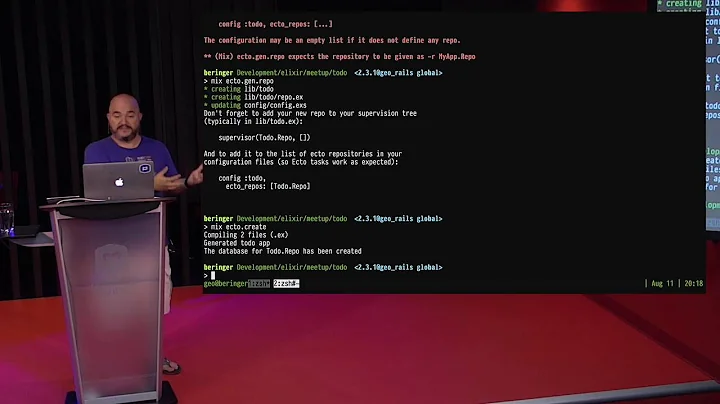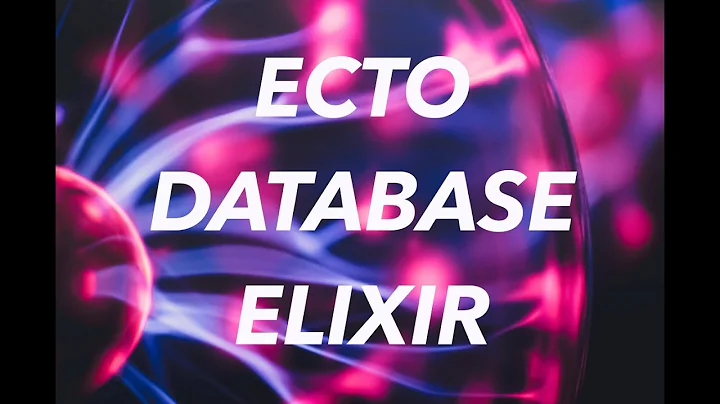Setting up Phoenix Framework and Ecto to use UUIDs: how to insert the generated value?
Solution 1
EDIT: I have updated this answer to Ecto v2.0. You can read the previous answer at the end.
Ecto v2
Handling UUIDs in Ecto has become much more straight-forward since the original answer. Ecto has two types of IDs: :id and :binary_id. The first is an integer ID as we know from databases, the second is database specific binary. For Postgres, it is a UUID.
To have UUID as primary keys, first specify them in your migration:
create table(:posts, primary_key: false) do
add :id, :binary_id, primary_key: true
end
Then in your model module (outside the schema block):
@primary_key {:id, :binary_id, autogenerate: true}
When you specify the :autogenerate option for :binary_id, Ecto will guarantee that either the adapter or the database will generate it for you. However, you can still generate it manually if you prefer. Btw, you could have used :uuid in your migration and Ecto.UUID in your schema instead of :binary_id, the benefit of :binary_id is that it is portable across databases.
Ecto v1
You need to tell your database how to automatically generate the UUID for you. Or you need to generate one from the application side. It depends which one you prefer.
Before we move on, it is important to say that you are using :uuid that will return binaries instead of a human readable UUIDs. It is very likely you want to use Ecto.UUID which will format it as a string (aaaa-bbb-ccc-...) and that's what I'll use below.
Generating in the database
In your migration, define a default for the field:
add :id, :uuid, primary_key: true, default: fragment("uuid_generate_v4()")
I am assuming you are running on PostgreSQL. You need to install the uuid-ossp extension with CREATE EXTENSION "uuid-ossp" in pgAdmin or add execute "CREATE EXTENSION \"uuid-ossp\"" in the migration. More information about the UUID generator can be found here.
Back to Ecto, in your model, ask Ecto to read the field from the database after insert/update:
@primary_key {:id, Ecto.UUID, read_after_writes: true}
Now, when you insert, the database will generate a default value and Ecto will read it back.
Generating in the application
You will need to define a module that inserts the UUID for you:
defmodule MyApp.UUID do
def put_uuid(changeset) do
Ecto.Changeset.put_change(changeset, :id, Ecto.UUID.generate())
end
end
And use it as a callback:
def model do
quote do
use Ecto.Model
@primary_key {:id, Ecto.UUID, []}
@foreign_key_type Ecto.UUID
before_insert MyApp.UUID, :put_uuid, []
end
end
before_insert is a callback and it will call the given module at the given function with the given arguments, with a changeset representing what is being inserted being given as first argument.
That should be all. Btw, there is a chance this will be more streamlined in the future. :)
Solution 2
Also when creating a new project pass option --binary-id to use UUID as default primary key.(Starting Ecto v2)
mix phx.new project_name --binary-id
Related videos on Youtube
Theemuts
Updated on September 26, 2020Comments
-
Theemuts over 3 years
A few days ago I started using Elixir and the Phoenix Framework (v 0.12.0) with a Postgres database. I'm trying to create a table which has a UUID primary key, which I prefer over the sequential default.
After using
mix phoenix.gen.htmlto generate the model and migration files and following the other steps in the Phoenix docs, I have changeddef model do quote do use Ecto.Model end endin
web.extodef model do quote do use Ecto.Model @primary_key {:id, :uuid, []} @foreign_key_type :uuid end endas is mentioned in the Ecto docs. I have also changed the migration to
create table(:tblname, primary_key: false) do add :id, :uuid, primary_key: true [other columns] endUnfortunately, when I try to add an entry to the table from the auto-generated form, I get an error because the
idis null. If I manually add anid-column to the model, I receive an error that the column already exists. If I neglect to setprimary_keyto false intable/2and remove theidcolumn, the table is generated with a sequentialid-column.Do I need to manually set the
idin the changeset, or have I made an error in setting up my app to use UUIDs? Thanks in advance -
Theemuts about 9 yearsThank you for your quick reply! Unfortunately, both approaches lead to an error in Postgrex. If I generate the UUID in my app, I receive the following error: no function clause matching in Postgrex.Extensions.Binary.encode/4 I received the same error if I chain Ecto.Changeset.put_new_change/3 to the pipeline in the model to add the UUID to the parameters. If I let Postgres generate the UUID by calling uuid_generate_v4(), Postgrex complains the function does not exist: (Postgrex.Error) ERROR (undefined_function): function uuid_generate_v4() does not exist
-
Theemuts about 9 yearsAfter executing
CREATE EXTENSION "uuid-ossp"in pgAdminuuid_generate_v4()is working, the row is created correctly. The index view returns a UnicodeConversionError, however. -
José Valim about 9 yearsI am not sure why Postgres is complaining about
uuid_generate_v4(). Maybe you need to install some module? I don't remember the steps exactly so I have added a link to the docs. The other bugs are because you are using:uuidin the model instead ofEcto.UUID, I have explained why you want the later in the second paragraph. -
José Valim about 9 yearsI have also updated the code samples so others won't do the same mistake as us! Thanks for the feedback.
-
Josh W Lewis almost 9 years
CREATE EXTENSION "uuid-ossp"needs to be ran by the same database user that Ecto is using. So if Ecto is connecting as 'ecto-user', run the command as 'ecto-user'. Creating extensions doesn't seem to span accounts. -
Josh W Lewis almost 9 yearsI take that back,
CREATE EXTENSION "uuid-ossp";is database specific. Make sure you are connected to the database Ecto is using before installing the extension. I had to install it on both my dev and test databases. -
José Valim almost 9 yearsYou can also do it in a migration!
execute "CREATE EXTENSION \"uuid-ossp\"" -
websymphony almost 9 yearsSince ecto '0.12.1' using uuids for primary keys has become more streamlined. Here is an example gist for setting it up: gist.github.com/websymphony/48dbfc8e663da8a0d63d
-
 tumbudu over 8 yearsAnother import thing is specifying reference type as uuid.
tumbudu over 8 yearsAnother import thing is specifying reference type as uuid.add :post_id , references(:posts, type: :uuid) -
Qqwy almost 8 yearsI believe callbacks are deprecated in newer versions of Ecto. How do we generate default values (that cannot be known at compile-time) in the application now?
-
Paul Fioravanti over 7 yearsThis answer and the Ecto.Schema docs helped me get UUIDs working for Postgres.
-
Trevoke over 7 yearsTried the solution for v2 like this:
Mud.Repo.insert(%Mud.Room{description: "Room", exits: %{"w" => 1}})getting an error that id is null and is not allowed to be null. -
Trevoke over 7 yearsNever mind, got it - found another blog entry that showed me what I had misunderstood. Suggested edit to this response for clarification.







